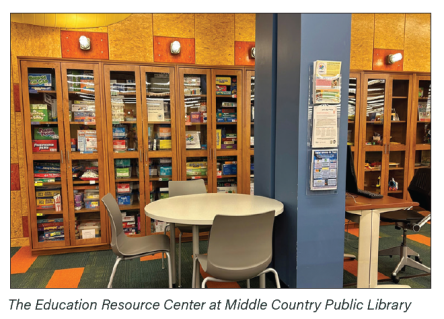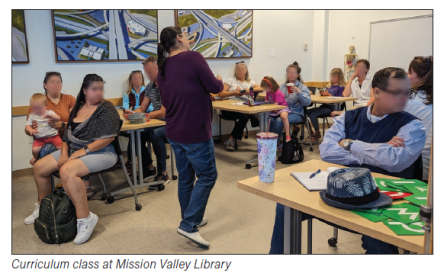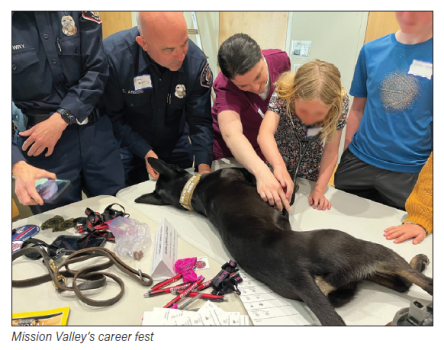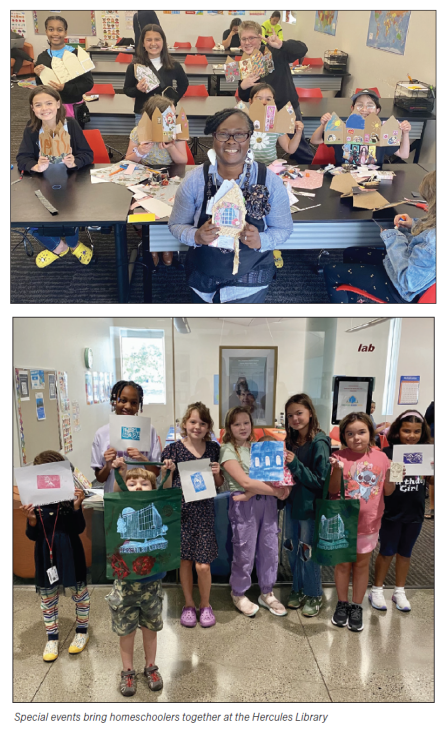|
FEATURE
Building and Sustaining Homeschooling Centers at Three U.S. Public Libraries
by Deborah Hempe, Marika Jeffery, and Alison Peters
| All three library [Homeschool Resource Centers], with their different offerings and funding, provide blueprints on how to create community with homeschoolers. |
 |
 |
 |
 |
Across the country, the number of homeschooling families has been on the rise for several years. Additionally, according to The Washington Post-Schar School poll conducted in 2023, the reasons parents decide to homeschool have changed over time and are much more varied than they used to be. As such, public libraries are increasingly a place where homeschooling families spend time and seek resources to aid in the education of their children. In this article, three public libraries (one located in New York and two in California) will share information regarding the programs, resources, and policies they have developed to serve the growing needs of this community.
Education Resource Center at Middle Country Public Library in Centereach, N.Y.
Middle Country Public Library (MCPL) provides access to a wide range of programs, services, technology, and resources to meet the needs of a diverse community. In 2015, it included improved outreach to the growing homeschool community in its long-range plan. After researching funding opportunities, a grant proposal was submitted to the Long Island Community Foundation, and $15,000 was awarded to develop the Education Resource Center (ERC) as a regional initiative available to all homeschooling families residing in Nassau and Suffolk counties. The ERC provides support and enrichment for homeschooling families and educators across Long Island, with access to circulating science equipment and kits, math manipulatives, curricula, and educational games, plus online resources such as subscription databases and ERC programming. Homeschooling families who reside in library districts other than Middle Country may apply for and receive ERC cards on an annual basis. The cards provide access to the ERC collection as well as other collections, including the Library of Things’ education collection (which is STEM-based and coding-based), preloaded learning tablets, access to databases, and registration for select programs each season.
The ERC’s webpage (mcplibrary.org/education-resource-center) serves as a valuable resource to homeschooling families and those who are considering homeschooling, as it includes links to a curated list of homeschool-focused websites, highlights homeschooling books and periodicals available in the library’s parent collection, and contains links to all of MCPL’s youth-oriented databases and to program registration for ERC-designated programs.
Each season, a selection of school-age and teen programs are offered to ERC cardholders. In addition, Homeschool Meet-Up for school-age families and Homeschool Hangout for teens—scheduled on the same day and at the same time—are held several times each season. Homeschool Meet-Up offers an opportunity for families to network and learn about library resources while utilizing the activities set out for the session. These have included scavenger hunts, STEM and financial literacy activities, and ERC games and kits that can be checked out at the end of the program for further exploration at home. Homeschool Hangout enables teens to socialize and spend time together in the library’s teen space while utilizing the computers, technology tubs, and media station or engaging in other activities, such as simple crafts.
Main partnerships for this initiative have been with homeschool co-op groups and homeschool leaders. Initially, focus groups were held with local homeschool parents who provided feedback on materials to purchase for the collection. At times, homeschool leaders have offered Homeschooling 101 programming, in which they share their knowledge and experiences with parents who are considering or are new to homeschooling. Homeschool co-op groups are able to request room usage to work on educational projects, with an ERC librarian providing resources and serving as a connection and point of contact at the library. Email newsletters are regularly utilized as a tool to communicate with ERC cardholders regarding upcoming programming and special opportunities.
MCPL partners with local museums to offer special programming and grant-funded opportunities that specifically benefit the library’s homeschool patrons. The library regularly applies for and has participated in ALA-supported grant opportunities (such as NASA at My Library and the Thinking Money for Kids initiative). Through these affiliations, MCPL had been able to add to the ERC collection with space backpacks, money/math games, and manipulatives and kits that were received and/or developed through financial literacy grants supported by ALA and FINRA.
Homeschool Resource Center at Mission Valley Branch Library in San Diego
Mission Valley Library opened its Homeschool Resource Center (HRC) in April 2023 and currently remains the only public library with an HRC within the city of San Diego as well as the larger 4,500 square miles of San Diego County. Even before the HRC opened, Mission Valley Library was a destination for homeschoolers due to its centralized location with easy parking and access to public transit, making it a quick and convenient place for nontraditional educators and learners to meet. This library location is one of 37 branches that make up the San Diego Public Library (SDPL) system.
Using a $52,000 grant from IMLS and funds from the Mission Valley Friends of the Library, staffers consulted with homeschooling stakeholders to transform an old computer lab into the current HRC. The room can be configured for lecture-style presentations or group collaborations and can be reserved free of charge for various educational programs and meetings of up to 18 people. The HRC offers the following resources:
- Educational kits covering a variety of topics and ages, available for circulation with a library card. For example, patrons may check out magnetic alphabet letters, math manipulatives, rock collections, graphing calculators, and microscopes.
- Books for checkout, including homeschooling theory for parents, general nonfiction for middle and high school students, and decodable text for children learning how to read
- Laptops for in-house STEM programs
- Equipment, including a laminator and a book spiral binder, as well as other office supplies
- Sample homeschool curriculum covering reading, math, social studies, and science
- Free programs for students, such as art, weaving, Python coding, environmental science, and literature, as well as supportive discussions and lectures for homeschooling parents
The HRC’s website (sandiego.gov/public-library/home school-resource-center) highlights the center’s physical resources, as well as SDPL’s digital resources, including online homework help, Rosetta Stone, and research databases. Anyone with an SDPL card can check out the physical or virtual materials, and no proof of homeschooling is required. California is very flexible with its homeschooling laws; certain families can choose to homeschool entirely on their own, but a good portion of the state’s homeschoolers are enrolled in state-funded specialized charters that provide credentialed teachers, curriculum, and extracurriculars to their homeschooling student body. Pacific Coast Academy, Dimensions Collaborative, and Audeo Kids are just a few of the many homeschooling charters in the San Diego area. Mission Valley Library has struck up partnerships with these institutions, which in turn help to advertise the HRC and its programs to their enrolled homeschoolers.
In addition to these charter partnerships, a major part of the HRC’s success has come from the collaborations the library has cultivated with nonprofit organizations such as the San Diego Creative Weavers Guild, the National Marine Mammal Foundation, the EcoLogik Institute, the League of Amazing Programmers, Write Out Loud, and Words Alive—all of which provide excellent arts and sciences programming to local youth. Partnerships and feedback from the community have been essential to the success of the HRC. Patron feedback has been overwhelmingly positive, and Mission Valley Library has served many new patrons—several of whom brave the Southern California traffic to travel 20-plus miles to visit the HRC.
The Homeschool Resource Center at Hercules Library in Hercules, Calif.
Hercules Library is a state-of-the-art facility built collaboratively by the city of Hercules, the state of California, and Contra Costa County. When it opened in 2006, it included a computer lab—a large, bright room at the front of the library. Post-pandemic, staff reopened the library to a changed world, but the computer lab stayed closed, as the computers were no longer state-of-the-art and children were no longer coming in droves for Minecraft-ing days. Library staffers suddenly had the happy problem of a big, unused room and began brainstorming on what to do with it.
Hercules’ library manager attended the 2023 California Library Association Conference and was inspired by a poster session from SDPL, charting the journey to developing its HRC. Hercules was seeing an uptick in homeschooling families requesting programs during midday hours, space for holding meetings and study, and a desire to form communities of similar-aged homeschoolers. Hercules Library staffers devised a plan for an HRC, with key considerations in mind. The room would be open during the library’s regular hours and available to the homeschool community exclusively between 10 a.m. and 2 p.m. on weekdays. It would be self-service, with patrons coming to the information desks for library assistance. Programs for the homeschool community would be scheduled during midday hours, by request from the community, and to ensure maximum availability of library staffers for regular library services.
The Friends of the Hercules Library and Hercules Library Foundation agreed to financially support the HRC, with the latter helping purchase STEAM kits, and the former sponsoring programs. Library staff went into this project very budget conscious and with the motto of Big Ideas, Small Budget. In 2024, with one homeschool program per month, $1,200 was spent on programs and $450 on STEAM kits. No additional furniture or hardware was needed. Fifty dollars was spent on school supplies and educational posters to make the room feel classroom-like. Staff determined that the STEAM kits would not circulate, and families could enjoy them in the Homeschool Room. This removed the necessity to involve the county collection development and circulation departments.
The HRC at Hercules Library opened to the public in October 2023. More than 100 people from across the Bay Area attended the grand opening, appreciative of the space and advocating for more homeschool resources. One year later, the HRC is a study, play, and group meeting space. Patrons check in at the library’s main info desk and do not have to show homeschool credentials or a library card to use the space. The room is intended for group use and is not reservable. Rather, it is a place to come be with other like-minded families and create community.
Groups of homeschool families, who met for the first time at the library, now meet for activities, including pop-up book clubs, Valentine’s Day crafting, and game days organized by parents/caregivers. STEAM kits, modeled on those from SDPL, are enjoyed and serve as educational aides. Programs are held monthly, and each one has been filled to capacity. There is one STEM program followed by one creative program, held in rotation, and most of the presenters are happy to provide free and low-cost options for this endeavor. The library has conducted programs on using Raspberry Pi kits, Skull Detective workshops with local parks, Homeschooling 101 presented by local homeschoolers, DIY bookmaking with a local artist, writing workshops, astronomy primers, screen printing, and a robotics workshop led by high-school experts. Library staffers are stretching their own imaginations, reaching out to the community, and—most importantly—really getting to know this group of patrons and welcoming them to the library.
Into the Future
All three library HRCs, with their different offerings and funding, provide blueprints on how to create community with homeschoolers. By offering a combination of educational resources and STEM and arts-based programs, as well as actively exploring and collaborating with community groups, these libraries have not only filled a vital gap for homeschooling families but also contributed to the overall growth of educational opportunities in their areas. Future plans at MCPL include increased outreach to the other libraries in the region with hopes of reaching more homeschool families.
Additionally, as several years have passed since the ERC was launched, plans are underway to survey current homeschool parents and youth with the goal of improving services for current and future homeschool families. Both libraries in California continue to see a demand for programs and socialization opportunities for students and parents and are looking for ways to provide robust resources with limited funds and staff time. As other libraries look to expand their services, these examples serve as valuable models for creating accessible, adaptable, and enriching homeschool support systems that benefit families and learners alike. |